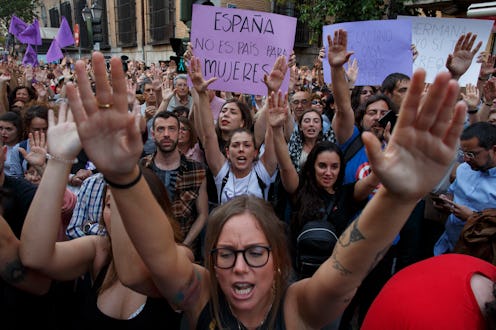News
A Woman Was Sexually Assaulted By 5 Men In Spain — But A Court Decided It Wasn’t Rape

In July 2016, an 18-year-old women was allegedly gang raped in Spain during the Running of the Bulls festival. The woman told police that five men in their mid-20s allegedly took turns raping her after offering to walk her to her car. The subsequent trial for these five men — which became known as the Wolf Pack case in Spain, named after a WhatsApp group they were all in together — ultimately found the men guilty of sexual abuse on Thursday, but not of rape. As a result, thousands of people have taken to the streets across Spain to protest the charges as too lenient.
The five defendants in the case were all part of a WhatsApp group called "la manada," which translates to "wolf pack." In the immediate aftermath of the assault, the defendants reportedly sent messages about raping the woman, saying they had video footage, but the judge in the trial did not allow the jury to consider these or other messages sent by the defendants. However, the footage itself — which was compromised of seven videos lasting roughly 96 seconds — was viewed during the trial, and reportedly showed all five men raping the accuser.
Although the men were accused of gang rape based on the accuser's testimony and the video evidence, they were sentenced to nine years in prison on the lesser charge of sexual abuse, and are required to pay a little over $12,000 each to the woman who accused them. Prosecutors originally sought 22 years in prison on the charge of rape. But according to the Spanish newspaper El Pais, the Wolf Pack case has sparked an intense debate about what constitutes sexual assault under Spanish law.
El Pais reported that under Spanish law, prosecutors must be able to prove in court that the accuser faced violence or intimidation from their attackers in order for the defendants to be convicted with rape or sexual aggression. In the Wolf Pack case, magistrates agreed that the woman had her consent compromised, but argued that there had been no violence because there had been no physical aggression to overcome the accuser's will.
The magistrates appear to have interpreted the law as requiring a victim to fight back against their attackers in order to prove that they had faced violence. Amnesty International argued on Twitter that the Wolf Pack case "could be sending a worrying message: if women don't resist, there is no rape."
According to CNN, the prosecution plans to appeal the verdict — which was handed down by a three-judge panel — in order to obtain a longer sentence, and demonstrators and lawmakers across the country have expressed their outrage. There have been large marches in Madrid, Barcelona, Valencia, Alicante, and Pamplona, where the verdict was handed down. The Guardian reported that protesters in Pamplona shouted “This justice is bullshit!”, “It’s not abuse, it’s rape!” and “If they touch one of us, they touch all of us!” after the verdict was publicly announced on Thursday.
In response to the ruling and the widespread protests, the Spanish government has pledged to reassess the country's laws on sexual crimes. Other political leaders have also spoken out against the judges' decision, with Defense Minister Maria Dolores de Cospedal describing the sentence as "too little" and Susana Díaz, Andalusia's regional president, calling for "zero tolerance for sexual violence" after condemning the ruling. Justice Minister Rafael Catalá specifically criticized the third judge in the case, who reportedly wanted to acquit all five defendants from all crimes other than stealing the accuser's cell phone.
Media outlets like the BBC have likened the Wolf Pack case to Spain's "#MeToo moment," with demonstrators using the slogan and hashtag "Yo te creo" — I believe you — to support the accuser in this case and all other victims and survivors. As protester Iria Grandal told CNN in Madrid, the fight for women's rights continues to rapidly accumulate support in Spain; on International Women's Day, more than five million workers reportedly joined the country's first nationwide feminist strike.
"In Spain, there is still a lot of machismo and misogyny, in jobs, salaries, and including young people," Grandal told CNN. "But I think things are changing now. You could see it in the massive demonstration on March 8 — for International Women's Day — and you could see it now. Women will no longer remain silent, and the youngest among us are also taking to the streets to protest."
Joseph D. Lyons contributed to this report.